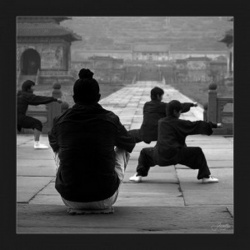Practice of Cessation from the Awakening of Faith in Mahayana
Should there be a man who desires to practice "cessation", he should stay in a quiet place and sit erect in an even temper. His attention should be focused neither on breathing nor on any form or color, nor on empty space, earth, water, fire, wind, nor even on what has been seen, heard, remembered, or conceived.
All thoughts, as soon as they are conjured up, are to be discarded, and even the thought of discarding them is to be put away, for all things are essentially in the state of transcending thoughts, and are not to be created from moment to moment nor to be extinguished from moment to moment; thus one is to conform to the essential nature of Reality (dharmata) through this practice of cessation. And it is not that he should first meditate on the objects of the senses in the external world and then negate them with his mind, the mind that has meditated on them. If the mind wanders away, it should be brought back and fixed in "correct thought."
It should be understood that this "correct thought" is the thought that whatever is, is mind only and that there is no external world of objects as conceived; even this mind is devoid of any marks of its own which would indicate its substantiality and therefore is not substantially conceivable as such at any moment. Even if he arises from his sitting position and engages in other activities, such as going, coming, advancing, or standing still, he should at all times be mindful of the application of expedient means of perfecting "cessation," conform to the immobile principle of the essential nature of Reality, and observe and examine the resulting experiences.
When this discipline is well mastered after a long period of practice, the ideations of his mind will be arrested. Because of this, his power of executing "cessation" will gradually be intensified and become highly effective, so that he will conform himself to, and be able to be absorbed into, the "concentration (samádhi) of Suchness." Then his defilements, deep though they may be, will be suppressed and his faith strengthened; he will quickly attain the state in which there will be no retrogression. But those who are skeptical, who lack faith, who speak ill of the teaching of the Buddha, who have committed grave sins, who are hindered by their evil karma, or who are arrogant or indolent are to be excluded; these people are incapable of being absorbed into the samádhi of Suchness.
Next, as a result of this samádhi, a man realizes the oneness of the World of Reality (Dharmadhatu), i.e., the sameness everywhere and non-duality of the Dharmakaya of all the Buddhas and the bodies of sentient beings. This is called "the samádhi of one movement." It should be understood that the samádhi of Suchness is the foundation of all other samádhi; if a man keeps practicing it, then he will gradually be able to develop countless other kinds of samádhi.
If there is a man who lacks the capacity for goodness, he will be confused by the evil Tempter, by heretics and by demons. Sometimes these beings will appear in dreadful forms while he is sitting in meditation, and at other times they will manifest themselves in the shapes of handsome men and women. In such a case he should meditate on the principle of "Mind only," and then these objects will vanish and will not trouble him any longer.
Sometimes they may appear as the images of heavenly beings or Bodhisattvas, and assume also the figure of the Tathágata, furnished with all the major and minor marks; or they may expound the spells or preach charity, the precepts, patience, zeal, meditation, and wisdom; or they may discourse on how the true nirvana is the state of universal emptiness, of the nonexistence of characteristics, vows, hatreds, affections, causes, and effects; and of absolute nothingness.
They may also teach him the knowledge of his own past and future states of existence, the method of reading other men's minds, and perfect mastery of speech, causing him to be covetous and attached to worldly fame and profit; or they may cause him to be frequently moved to joy and anger and thus to have unsteadiness of character, being at times very kind-hearted, very drowsy, very ill, or lazy-minded; or at other times becoming suddenly zealous, and then afterward lapsing into negligence; or developing a lack of faith, a great deal of doubt, and a great deal of anxiety; or abandoning his fundamental excellent practices toward religious perfection and devoting himself to miscellaneous religious acts, or being attached to worldly affairs which involve him in many ways; or sometimes they may cause him to experience a certain semblance of various kinds of samádhi, which are all the attainments of heretics and are not the true samádhi; or sometimes they may cause him to remain in samádhi for one, two, three, or up to seven days, feeling comfort in his body and joy in his mind, being neither hungry nor thirsty, partaking of natural, fragrant, and delicious drinks and foods, which induce him to increase his attachment to them; or at other times they may cause him to eat without any restraint, now a great deal, now only a little, so that the color of his face changes accordingly.
For these reasons, he who practices "cessation" should be discreet and observant, lest his mind fall into the net of evil doctrine. He should be diligent in abiding in "correct thought," neither grasping nor attaching himself to anything; if he does so, he will be able to keep himself far away from the hindrance of these evil influences. He should know that the samádhi of the heretics is not free from perverse views, craving, and arrogance, for the heretics are covetously attached to fame, profit, and the respect of the world.
The samádhi of Suchness is the samádhi in which one is not arrested by the activity of viewing a subject nor by the experiencing of objects in the midst of meditation, even after concentration one will be neither indolent nor arrogant and one's defilements will gradually decrease. There has never been a case in which an ordinary man, without having practiced this samádhi, was still able to join the group that is entitled to become Tathágatas.
Those who practice the various types of Dhyana (meditation) and samádhi which are popular in the world will develop much attachment to their flavors and will be bound to the triple world because of their perverse view that atman is real.
They are therefore the same as heretics, for as they depart from the protection of their good spiritual friends, they turn to heretical views. Next, he who practices this samádhi diligently and whole-heartedly will gain ten kinds of advantages in this life. First, the Buddhas and the Bodhisattvas of the ten directions will always protect him. Second, the Tempter and his evil demons will not frighten him. Third, he will not be deluded or confused by the ninetyfive kinds of heretics and wicked spirits.
Fourth, he will keep himself far away from slanderers of the profound teaching of the Buddha, and will gradually diminish the hindrances derived from grave sins. Fifth, he will destroy all doubts and wrong views on enlightenment. Sixth, his faith in the Realm of the Tathágata will grow. Seventh, he will be free from sorrow and remorse and in the midst of samsára will be full of vigor and undaunted.
Eighth, having a gentle heart and forsaking arrogance, he will not be vexed by others. Ninth, even if he has not yet experienced samádhi, he will be able to decrease his defilements in all places and at all times, and he will not take pleasure in the world. Tenth, if he experiences samádhi, he will not be startled by any sound from without. Now, if he practices "cessation" only, then his mind will be sunk in self-complacency and he will be slothful; he will not delight in performing good acts but will keep himself far away from the exercise of great compassion. It is, therefore, necessary to practice "clear observation" as well.


